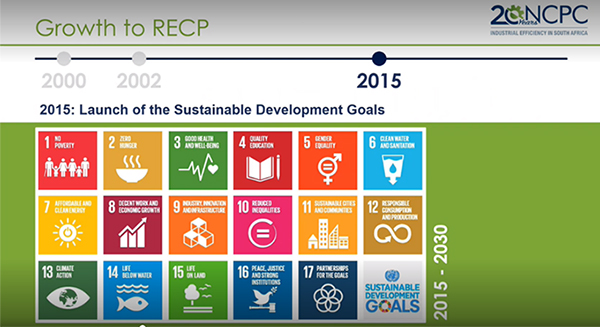
The College of Graduate Studies hosted an interdisciplinary seminar live in more than 17 countries across Africa, various parts of Europe, the United States and India. The seminar offered an informative account of the 20-year-old journey of the National Cleaner Production Centre South Africa (NCPC-SA) and its contributions to the Sustainable Development Goals (SDGs) through resource efficiency and cleaner production.

Screenshot of presentation
In order to achieve the 2030 Sustainable Development Goals, the seminar aimed to bridge the gap between academia and industry on environmental sustainability. Researchers from the CSIR who are at the forefront of eco-industrial parks, water efficiency and industrial energy discussed their contributions and how academia can contribute to producing graduates in these fields through research and courses.

Ndivhuho Raphulu (CSIR)
The NCPC-SA supports the South African industry to improve competitiveness and reduce its environmental footprint by implementing resource-efficient and cleaner production (RECP) methodologies. The keynote address of the CGS Interdisciplinary seminar gave an overview of the NCPC-SA, hosted by the Council for Scientific and Industrial Research (CSIR). Furthermore, contributions to the 2030 SDGs and academic gaps to inform practice were discussed.
Through workshops and other platforms, the NCPC offers various services to industry, such as plant assessment, training of industry and professionals, assistance in redirecting industrial waste, advocacy and awareness through workshops and other platforms, and the development and sharing of sector and industry guides and tools.
In his presentation on the NCPC-SA journey, Ndivhuho Raphulu from the CSIR said that the Millennium Development Goals (MDGs) had eight objectives and clear deadlines for improving the lives of the world’s poorest people. The goals were ratified at the 2002 World Summit and became the Johannesburg Plan of Action. One of the agreed-upon goals was to set up an implementing agency or programme in each of the 189 countries. The programme was then named the NCPC. The NCPCs are hosted and managed by a university or a scientific and industrial research centre. However, the MDGs had one of the most significant gaps: no framework to hold member countries accountable and responsible for implementing goals. Therefore, there was a process to amend the MDGs, which led to the Sustainable Development Goals (SDG) launch in 2015. In the process of changing MDGs to SGDs, the United Nations Industrial Development Organisation (UNIDO) and the United Nations Environmental Programme (UNEP) came up with an industrial development strategy to contribute to the SDGs, specifically the aspects of resource efficiency and cleaner production.
Resource efficiency and cleaner production centres are environmental strategies that continuously improve processes, products and services to increase efficiency and reduce human and environmental risk. Throughout its journey since 2002, the NCPC has contributed to growing knowledge, promoting awareness, developing skills, demonstrating the impact of RCEP and focusing on energy.
* By Hanli Wolhuter, Communication and Marketing Specialist and Musa Buthelezi, Intern, College of Graduate Studies
Publish date: 2022-09-16 00:00:00.0